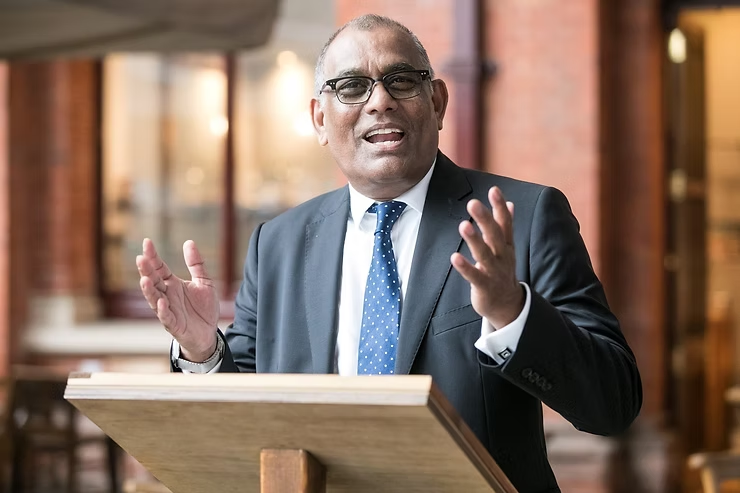Imran Chowdhury BEM
He is a British-Bangladeshi public figure
1) India seems to lack clarity on how to deal with post-Hasina Dhaka.
How far do you agree that it was India’s flawed diplomacy to count on one individual
politician instead of nurturing strong people-to-people relations?
Answer : “It is tempting to reduce the developments in post-Hasina Dhaka to a failure of
Indian diplomacy, but that would be a dangerously narrow reading of the situation. The
reality is far more layered and geopolitically complex. True, New Delhi placed
considerable strategic capital on a trusted partner in Prime Minister Sheikh Hasina, under
whose leadership bilateral relations reached unprecedented heights. Yet, this was not
merely a case of personal dependency. What unfolded was the result of a sophisticated,
covert Islamist resurgence—years in the making—that exploited every institutional
weakness in Bangladesh’s political fabric.
Moreover, one cannot overlook the role of external players beyond India. Certain Western
powers, uncomfortable with Dhaka’s growing strategic alignment with India and its refusal
to fully submit to Western geopolitical frameworks, subtly signaled their discontent.
Sanctions threats, critical human rights narratives, and selective diplomatic pressure
created political space for anti-India, Islamist-leaning elements to regroup and rebrand
themselves as ‘forces of democratic change.’ The so-called ‘bluffs’ by incumbents,
assuring continuity and moderation, were in fact part of a deeper game—one designed
to mask a carefully staged ideological shift that no single external actor could fully
neutralize, least of all India alone.
While it is fair to say that stronger people-to-people ties could have added resilience to
India’s position, blaming New Delhi without acknowledging the covert Islamist capture
and the West’s geopolitical maneuvering would be an incomplete and, frankly, misleading
FPRC Journal-62 (2025-2) India-Bangladesh Relations
Analysis. The transition in Dhaka is not simply a diplomatic failure—it is a textbook case
of how ideological subversion and great-power rivalry can collide to reshape a nation’s
trajectory in ways thhttps://mail.google.com/mail/u/0/#inbox/FMfcgzQbgJJnGxQrLzCKXffgfDZfThpn?projector=1at catch even the most seasoned players off guard.”
2) The minority issue has further strained India-Bangladesh relations, already tense due
to the interim government’s rhetoric and foreign policy choices. led by Muhammad Yunus.
Do you agree?
Answer : “There is no doubt that the minority issue has emerged as one of the most
sensitive and emotionally charged fault lines in India-Bangladesh relations today. While
these tensions have been worsened by the interim government’s confrontational rhetoric
and questionable foreign policy postures under Muhammad Yunus, one must also
understand the deeper social undercurrents that have been building for decades.
Since the 1980s, there has been a slow but systematic spread of exclusionary religious
narratives through mass preaching platforms such as waz mahfils, thousands of which
are held every week across the country, drawing massive crowds. These gatherings, far
from being inclusive spiritual events, have often been used to promote divisive messages
that paint minority communities as outsiders in their homeland. This has cultivated a
generational mindset that is now reaching its operational peak.
Muhammad Yunus, though internationally celebrated for his economic initiatives, appears
to be politically aligning with these entrenched forces, either by conviction or by necessity.
His dependence on an Islamist-leaning support base cannot be ignored. This alignment,
whether tacit or strategic, poses serious risks not just to minority communities within
Bangladesh, but also to regional stability and India’s long-term interests.
So yes, the minority issue is not just straining bilateral ties—it is exposing a deeper
societal drift that many had underestimated. What was once fringe messaging has now
entered mainstream discourse, emboldened by political cover. Unless this tide is
checked, the space for pluralism in Bangladesh risks shrinking even further.”
3) What should India do as Pakistan and Bangladesh get close and seek help?
“To understand the renewed Bangladesh-Pakistan alignment, one must trace its roots not
to recent developments alone, but to the unresolved historical currents dating back to
1974. The repatriation of stranded military and government officials, many of whom
remained psychologically and ideologically tethered to Pakistan, quietly reintroduced pro-
Pakistan elements into the newly independent Bangladesh’s state structure. What
followed was not sudden, but a slow institutional drift that began to show its true shape
over the past two decades.
From the rule of pro-Pakistan military dictators for over 15 years, to the caretaker
government of 2007-2009 dominated by the same ideological remnants, Bangladesh’s
trajectory toward what some might call ‘Pakistanisation’ has been disturbingly clear. The
rehabilitation of Jamaat-e-Islami into mainstream politics under democratic cover only
FPRC Journal-62 (2025-2) India-Bangladesh relations sealed what had long been in motion. This is not just a geopolitical realignment—it is a betrayal of the sacrifices made by millions of Bangladeshis and the Indian armed forces
who stood shoulder to shoulder for Bangladesh’s liberation.
In such a context, traditional diplomacy has minimal room to maneuver. India is
not dealing with a government making short-term policy adjustments; it is confronting an
institutional reorientation decades in the making, deeply embedded in the state’s security,
religious and political machinery.
That said, India cannot afford to disengage. Strategic patience, calibrated engagement
with democratic forces, and expanding ties with Bangladesh’s youth, civil society, and
economic sectors remain critical. But New Delhi must also prepare for the possibility that
Dhaka’s institutional trajectory may remain hostile for the foreseeable future and it will adjust
its regional security posture accordingly. This is no longer a matter of diplomatic
leverage—it is a matter of long-term strategic recalibration.”
4. Growing Chinese Influence adds a geopolitical dimension to India-Bangladesh bilateral
tensions. Do you agree?
“Do I agree that growing Chinese influence adds a geopolitical dimension to India—
Bangladesh tensions? Unequivocally, yes. But it goes even deeper than that.
For decades, there has been a carefully orchestrated agenda to embed anti-Indian
sentiment into almost every layer of Bangladeshi society, whether through education,
media, religious preaching, or political narratives. While the secular intelligentsia resisted
this tide for years, they have become increasingly isolated. The mainstream narrative
today paints India as the villain, the aggressor, and even, in extremist rhetoric, as an
existential threat to Bangladeshi Muslim identity.
This environment has made space for an equally systemic pro-China positioning. China
is projected not just as a partner in development but as a strategic counterweight—
The shield against so-called ‘Hindu India.’ It doesn’t matter that China is Buddhist in
heritage, communist in governance, or dictatorial; those factors are conveniently
ignored in favour of its utility as a geopolitical and psychological buffer against India.
Let’s not forget that the military relationship with China has been in place since 1975.
Decades of defence cooperation, military supply chains, and strategic alignment have
created a dependency that is hard to untangle. In the minds of many within Bangladesh’s
security and policymaking circles, China is the ‘savior’ that helps preserve their
sovereignty from India.
So yes, Chinese influence doesn’t just add a dimension; it fundamentally reshapes the
entire equation. India today faces not only an ideologically realigned Bangladesh but also
one that increasingly sees Beijing as its strategic guarantor. This is the uncomfortable
reality New Delhi must now confront.”*
FPRC Journal-62 (2025-2) India-Bangladesh Relations
5. A return to the status quo in Delhi–Dhaka ties is unlikely and arguably unviable given
the changed external and internal realities. How far is it true?
“It is true that a simple return to the old status quo in India-Bangladesh relations appears
unlikely in the near term, given the shifting internal dynamics in Dhaka and the growing
Influence of external actors like China and Pakistan. The political and ideological
landscape inside Bangladesh is going through what can only be described as a dark and
uncertain phase, where historical partnerships are being questioned and old narratives
are being manipulated to serve short-term power interests.
However, it would be premature—and indeed, strategically unwise—to discount the long-The
term resilience of India’s position. India remains unmatched in its cultural, historical, and
geographical connectivity with Bangladesh. Its soft power, rooted in shared language,
music, cinema, and the enduring spirit of 1971 continue to hold a special place in the
hearts of millions, even if this is often drowned out by political noise.
Moreover, India’s diplomatic machinery is known for its depth, professionalism, and
strategic patience. Indian interlocutors have consistently demonstrated the capacity to
manage complex relationships with both firmness and sensitivity. These qualities will
prove critical as Bangladesh navigates its internal contradictions and external
entanglements.
While the road ahead may be challenging, India’s track record as a reliable partner—
especially in Bangladesh’s most critical hour of need in 1971, stands as a testament to
the strength of this relationship. That historical bond, coupled with India’s geographic
proximity and cultural ties, gives New Delhi a long-term strategic advantage that others
simply cannot replicate.
So yes, the old status quo may be out of reach for now, but a new, more resilient
partnership is not beyond possibility. It will require patience, strategic engagement, and
a willingness to let Bangladesh rediscover for itself who its true friend has always been.
On that front, India has every reason to remain confident.”



